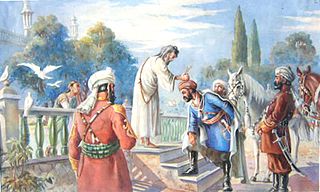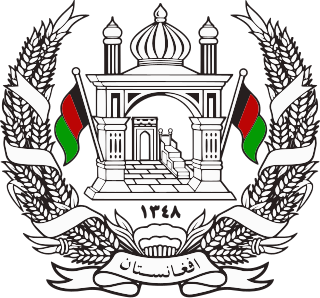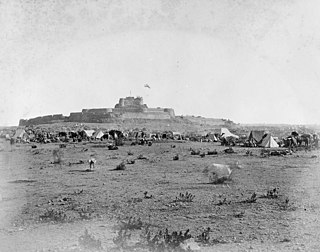
Awadh, known in British historical texts as Avadh or Oudh, is a historical region in northern India, now constituting the northeastern portion of Uttar Pradesh. It is roughly synonymous with the ancient Kosala region of Hindu, Buddhist, and Jain scriptures.
Nawab is a royal title indicating a ruler, often of a South Asian state, in many ways comparable to the western title of Prince. The relationship of a Nawab to the Emperor of India has been compared to that of the Kings of Saxony to the German Emperor. In earlier times the title was ratified and bestowed by the reigning Mughal emperor to semi-autonomous Muslim rulers of subdivisions or princely states in the Indian subcontinent loyal to the Mughal Empire, for example the Nawabs of Bengal.

Sardar Mohammad Azim Khan Barakzai was a Pashtun noble who served as Afghan governor of Kashmir (1812–1819). He was the second son of the Barakzai chief Payinda Sarfaraz Khan, while his elder brother Fateh Khan was kingmaker and Vizier to Mahmud Shah Durrani. He was one of 21 brothers from eight mothers including his half-brother Dost Mohammad Khan who would later become Emir of Afghanistan.

The Durrānī, formerly known as Abdālī (ابدالي), are one of the largest tribes of Pashtuns. Their traditional homeland is in southern Afghanistan, straddling into Toba Achakzai in Balochistan, Pakistan, but they are also settled in other parts of Afghanistan and parts of Khyber Pakhtunkhwa.

Mohammadzai, also spelled Moḥammadzay, is a Pashtun sub-tribe or clan of the Barakzai which is part of the Durrani confederacy of tribes. They are primarily centered on Kandahar, Kabul and Ghazni in Afghanistan as well as in the city of Charsadda in neighbouring Pakistan. The Mohammadzai ruled Afghanistan from 1823 to 1978, for a total of 155 years. Their rule ended under Daoud Khan when the Communists took power via a Soviet-backed coup.

Veraval is a city and the headquarters of Gir Somnath district in the Indian state of Gujarat. Somnath temple, a place of pilgrimage due to its importance as Jyotirlinga site dedicated to Hindu deity Shiva, is located here. It is also known for the hub of fishing industries in India.
The Achakzai or Achekzai are a Durrani Pashtun tribe that resides on both sides of the Durand Line, centered on Killa Abdullah District in Pakistan with some clans as far away as Afghanistan's Kandahar Province.

Anupshahr is a city and a municipal board, nearby Bulandshahr city in Bulandshahr district in the state of Uttar Pradesh, India. It is located on the bank of the holy river Ganga. It is on Bangar alluvial.
Sivagiri is a panchayat town and a tourist place in Tenkasi district in the Indian state of Tamil Nadu. Sivagiri is located at a distance of 50 km north to Tenkasi, 20 km south to Rajapalayam, 95 km north-west to Tirunelveli, 95 km south to Madurai, 540 km south to Bangalore, 150 km north to Thiruvananthapuram and 580 km south to the state capital Chennai.
Jalalabad is a city and a municipal council, just outside of Fazilka city in Fazilka district in the Indian state of Punjab. It is just 11 km from International India-Pakistan Border.

The Barakzai dynasty, also known as the Muhammadzai dynasty, ruled what is now Afghanistan from 1823 to 1978, when the monarchy ended de jure under Musahiban Mohammad Zahir Shah and de facto under his cousin Sardar Mohammad Daoud Khan. The Barakzai dynasty was established by Dost Mohammad Khan after the Durrani dynasty of Ahmad Shah Durrani was removed from power. As the Pahlavi era in Iran, the Muhammadzai era was known for its progressivist modernity, practice of Sufism, peaceful security and neutrality, in which Afghanistan was referred to as the "Switzerland of Asia".

The Pashtun tribes, are tribes of the Pashtun people, a large Eastern Iranian ethnic group who speak the Pashto language and follow Pashtunwali, the social code of conduct for Pashtuns. They are found primarily in Afghanistan and Pakistan and form the world's largest tribal society, comprising over 60 million people and between 350 and 400 tribes and clans. They are traditionally divided into four tribal confederacies: the Sarbani (سړبني), the Bettani (بېټني), the Ghurghusht (غرغښت), the Karlani (کرلاڼي) and a few allied tribes of those that are Ismailkhel, Khel, Ludin, Sakzai, and Zai.

Ghazi-ud-Din Haidar Shah was the last nawab wazir of Oudh from 11 July 1814 to 19 October 1818, and first King of Oudh from 19 October 1818 to 19 October 1827.
The Muslim social is a film genre in Bollywood that portrays Islamic culture in India. It flourished in the 1950s and 1960s and lasted till the early 1980s. Muslim socials are divided into two categories: "classic Muslim socials" that explore nawabi culture and focus on upper class or elite Muslim families, and "new wave Muslim socials" that portray middle class Muslim families who experience economic problems, discrimination and communal violence. Muslim socials often include ghazals, qawwalis, Urdu poetry and expressions, and musical forms commonly associated with Islamic culture. However, lately the label has also been criticized for cultural ghettoization of minority cinema. Director M.S. Sathyu who made Garam Hava (1973), called it "a skewed way to look at cinema. When there is no Hindu social or Christian social, how can there be a Muslim social".

Bārakzai is the name of a Pashtun tribe from present-day Kandahar, Afghanistan. '"Barakzai" is a common name among the Pashtuns and it means "son of Barak" in Pashto. According to the Encyclopædia Iranica, "In the detailed Pashtun genealogies there are no fewer than seven instances of the ethnic name Bārakzī, at very different levels of tribal segmentation. Six of them designate simple lineages within six different tribes located in the Solaymān mountains or adjacent lands... The seventh instance, on the other hand, designates one of the most important Pashtun tribes in numbers and historic role, part of the Zīrak branch of the Dorrānay confederation.

The Chawk Mosque is a mosque in the city of Murshidabad, India. It was founded in 1767 AD by Munny Begum, wife of Nawab Mir Zafar. Earlier in this place Nawab Murshid Quli Khan had built the "Chahel Sutan", which was the city's forty pillared audience hall. The mosque still recalls the stories of the ruling days of the Nawabs and still holds on its glory of the past.

Nawab "Ghazanfar-Jang"Bangash Khan (1665–1743) was the first Nawab of Farrukhabad in Uttar Pradesh, India. He was a "Bawan Hazari Sardar" in the Mughal Army. He served as governor of Malwa and Allahabad provinces of the Mughal Empire. He was also viceroy of Assam from 1735 to 1743. Although regarded as rude and illiterate, not understanding a single word of Persian or Pashto, he was well regarded for his loyalty, and it is believed that had fortune sided with him he would have been able to establish a kingdom rivalling those in the Deccan or Awadh.
Muhammad Dilawar Khanji was a Pakistani politician who was 11th Governor of Sindh from 1 March 1976 to 5 July 1977. He also claimed to be the titular Nawab of Junagarh from 1959–89.
The Third Battle of Katwa occurred between the Nawab of Bengal, Mir Qasim and the British East India Company in 1763. Dissatisfied with Nawab Mir Qasim's administration, the English deposed him in favor of his father-in-law Mir Jafar and officially declared war against Mir Qasim on July 7, 1763. The English command was given to Major Thomas Adams, who led a small force, variously estimated as between 3,000 and 5,000 men, of whom, approximately 1,000 were European. The Nawab had a total of approximately 25,000 troops at his disposal, led by the Armenian general Gurgin Khan. Although the Nawab's forces were numerically larger, they were hastily cobbled together and riven by internal strife. The Nawabi force that confronted the English at Katwa was a much smaller contingent under the leadership of the accomplished general Muhammad Taqi Khan, the Faujdar of Birbhum.

The Stratagem of Peshawar was a campaign of the Durrani empire led by Azim Khan Barakzai against the Nawab of Amb, Mir Nawab Khan Tanoli. Azim Khan who was the half-brother of Dost Muhammad Khan, the King of Afghanistan.











